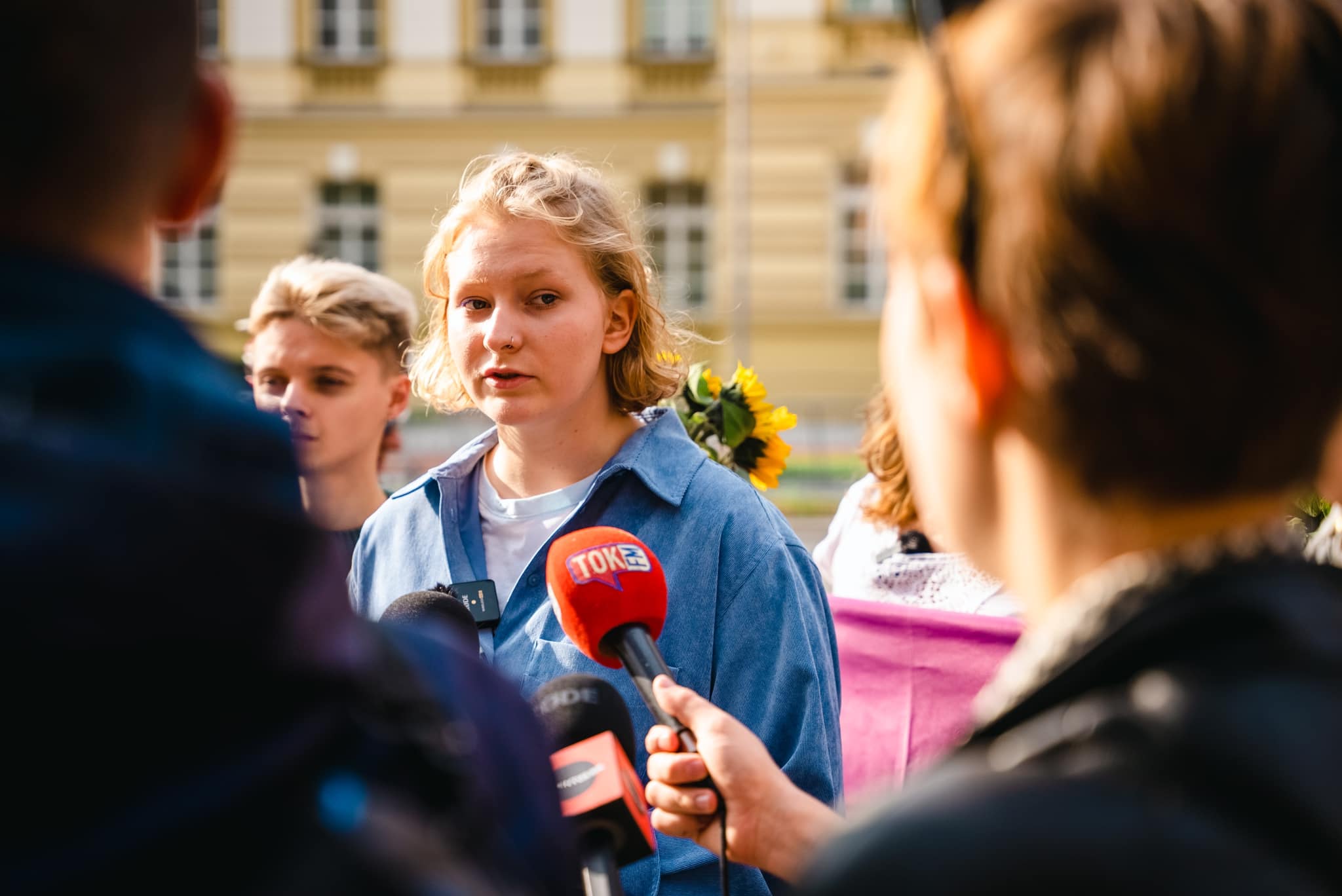If we consider where scientists, e.g. from IPSP, see the energy industry in 15 or 20 years, atom plays almost a negligible role there, as in the best-case scenarios it constitutes 12 percent of the mix. This is not an energy source that we should invest in heavily. This is not a long – term solution, easy to spread across the country – said Wiktoria Jędroszkowiak from Inicjatywa WSCHÓD and Fridays For Future in an interview with BiznesAlert.pl.
BiznesAlert.pl: Can the European Union’s climate policy become more effective as a result of Russia’s invasion of Ukraine?
Wiktoria Jędroszkowiak: The climate policy will be changing. The question is, for better or for worse. In the EU in recent months, it can be seen that often politicians, talking about solidarity with Ukraine and emphasizing that everything that is happening in the EU is with Ukraine in mind, cynically use this situation, running away from upping ambitions or raising goals that they had set earlier.
I have a perfect example from the G7 summit that was held in Germany this year. At the event, climate completely dropped off the agenda. There was no meaningful discussion about it, and this is the time for discussion. Most importantly, there was nothing that answered the demands of the scientific or activist community. This was explained away by the fact that this year the biggest problem was the war in Ukraine. Since the beginning of Russia’s aggression of Ukraine, I have tried to show in my actions that the whole war is a result and could not have happened if it had not been for the fact that the EU and countries of the global north relied on Russia and its fossil fuels. In this way, they fed the budget of the Russian Federation, and some continue to feed it through leaky oil and coal embargoes, as well as the lack of a gas embargo, they also dilute the European Union’s sanctions and make member states, including Poland, continue to pay Putin for fossil fuels. This results in the war being continued. This is a difficult situation in which we say that by not expanding climate options, that is, staying with fossil fuels, we will „save” Ukraine and our freedom. And the reason for this war is precisely that we’re sticking with fossil fuels.
How is Russia destroying the climate policy of Europe and the world?
This has been evident for years and highlighted by activists. The most striking and even grotesque example of this is the taxonomy and how the Taxonomy Act was adopted by the European Paliament. Gas and the atom were included in the Act, which determines what fuels the EU deems green and sustainable. The atom is controversial because it is not green. Even people who see the atom as the basis for the energy mix know that the atom is a blue fuel. While nuclear power is at least sustainable, natural gas, which is neither green nor sustainable, was adopted as well. Gas is a fossil fuel, just like coal, only less demonized in the eyes of the public opinion. The European Parliament has put a green stamp on natural gas, calling into question existing climate policy and the stated goals of moving away from fossil fuels.
This is all the more interesting when we look at the faces of the European Union’s climate policy. Ursula von der Leyen, Frans Timmermans talk about how quickly we need to move away from fuels from Russia. They argue that it is fuel from buses, that Putin is a dictator and uses this influence to pay for, for example, bombs falling on cities in Ukraine; at the same time they signed contracts with Saudi Arabia or with the former autocratic government of Colombia. We see this in Poland as well.
What countries, besides Russia, are sabotaging climate action?
Poland is such a country, Hungary as well. It is very important that we do not forget how our government has approached climate policy in recent years. Mateusz Morawiecki was the prime minister who blocked the more ambitious demands of other European countries at European Council summits. He was the roadblock and made it difficult, for example, to set a 2030 emissions reduction target; which resulted in the target being lower. Polish MEPs do the same, not just those from the Law and Justice. Those from the more neoliberal bubble do the same. They hide behind talking about gas as a transitional fuel, and at the same time they promote this fuel, playing with what climate policy will look like in 20 or 30 years. We know they won’t experience it themselves. They will not face the consequences of their actions. We have a climate minister who has held this office for less than a year and has continued to uphold the disastrous deal with the miners ever since. This agreement continues to pretend that we will be extracting coal until 2049, and this is not possible, is not profitable and is not in line with the climate policy goals of the European Union or scientists. In recent days, she said that the priority for Poland was now gas – this is nonsense, because fossil fuels are not able to provide us with energy security. Now we are in an energy crisis but the minister has become the face of many other crises in Poland. On the one hand, the crisis in the Oder, which is not a climate crisis per se, but a huge environmental crisis; on the other hand, we have the climate crisis and the heat waves of recent months, drying up rivers, and in other parts of the country flooding; and finally there is the energy crisis, which the ministry cannot cope with.
We are after years of fighting for anti-smog laws that have led to the fact that the fight against smog was successful and we had better and better standards in the cities, and now one winter can spoil it. All the resources that have been allocated to the fight against smog can be considered squandered, because we are saying yes to coal again, even the dirtiest kind. For years, the government has been pushing for the replacement of coal-fired stoves, so those who have done so will be able to feel aggrieved because they will not get the coal allowance. The benefit could be more sensibly settled. We would not have enough time to build wind farms, and the point is to survive this winter, but the government could have spent the money on insulating houses as a third of Polish homes are not winterized. It would be possible to insulate 200,000 buildings, which is a lot. Minister Moskwa has become for me a symbol of failure unable to cope with overlapping crises.
Should the atom be recognised in the climate policy in this climate crisis?
We must do everything we can to stop the crisis that is already under way. It is ravaging the most vulnerable climate areas. It is difficult to tell whether the solutions that are being introduced to fight the energy crisis are adequate. What matters is where we prioritize. If we consider where scientists, e.g. from IPSP, see the energy industry in 15 or 20 years, atom plays almost a negligible role there, in the best-case scenarios it constitutes 12 percent of the mix. This is not an energy source that we should invest in heavily. This is not a long – term solution, easy to distribute across the country, or more importantly-cheap. The crises we face, including the climate crisis, have a big impact on inflation and the financial crisis. This is very important. Therefore, the atom serves well the places where it already exists. It is not good as a priority of Polish climate policy. There is also an ideological debate about how we should adapt our energy sources so that they are socially just. The energy we generate cannot once again be based on bloody commodities, it should not be built from materials created in Africa as a result of the exploitation of children. That’s an important point. As far as RES is concerned, we can still do a lot to make it as fair as possible, so that Europe’s energy transition does not become an extension of colonialism. We can do this in a way that is socially just and in the hands of the people. We see what happens when power plants are concentrated and centralized. These sources do not pass the test when reality is changing as fast as it is now.
Did you report on your social media that one of the largest energy companies in Poland has fewer PV farms than the owner of Biedronka (popular supermarket chain in Poland – ed.)? What should the government do to change that?
First of all – unlock the possibility of mounting renewable energy installations. Both wind turbines and photovoltaics. This is what the whole business is waiting for. There are small and medium-sized enterprises that are waiting for the launch of photovoltaics in Poland, and this is constantly blocked. Because subsidies are not enough, we do not encourage people to do so. The same goes for heat pumps. They are difficult to access because the government has no influence over regulating this availability; they are also expensive and often the average Pole cannot afford them. This is some kind of a priority. Another is the awareness that the energy crisis is not just about the energy industry. We should already be thinking about our agriculture and moving away from industrial farms. We should fight against the transport exclusion, which is one of the largest in Europe, and invest in rail links instead of the Solidarity Transport Hub, which will be connected to a new airport, which we simply do not need. We should adapt policies that go beyond energy and beyond climate in a physical sense. The task for now is to pass the wind turbine act and end the senseless fight against onshore wind. More than 60 percent of Poles believe that this is the best solution for the current energy situation. Then, the implementation of the program of construction of local biogas plants. A sensible distribution of the money that energy companies have earned from the crises. Then, putting photovoltaic panels on all public buildings. It can start happening now.
What shape should the European Union’s climate policy take, given the current crisis?
The current RePowerEU package is a good move, but not ambitious enough. We should aim for a minimum of 55% of energy from renewable sources in 2030, and not 40%, as the European Commission is now calling for. The question is also how the Polish government will implement such solutions as, for example, the initiative to build photovoltaic panels on public buildings.
The whole new Green Deal will stop the warming at 1.5 Celsius, because that goal is not ambitious enough. If we put both emission reductions and further economic growth in one package, then something is wrong. We need to think about how to reform the idea of climate policy more and how to make it fair. This situation is similar to what i happening with the taxonomy. Politicians need to stop polling woold over people’s eyes. They should stand in front of a mirror and ask themselves if their climate policy means they have done enough. Then it will turn out that the Green Deal is not.
What about it?
We’ve reached a certain point. Its main creator, Frans Timmermans, admits that the plan is not ideal. We must start from this and yet implement its provisions as soon as possible.
We need to pay more attention to the just transition and how to manage the Just Transition Fund. Poland receives huge money from this fund, which is allocated for the construction of new roads and highways. This has little to do with the struggle for a just transition. More globally, it must be remembered that the EU is failing to deliver on the promises it has been feeding to the countries of the global south from summit to summit. It does not deliver money for Climate Finance or Loss and Damage. France, which has just handed over the EU presidency, is the country allowing the construction of the longest insulated pipeline in the world. The pipeline, being built by France’s Total and China’S CNOOC, is expected to destroy diverse areas in Tanzania and Uganda. Already, as a result of the construction, people are displaced, and the investment will lead to the fact that animals will die there. This is something for which we should take greater global responsibility, and EU countries should control each other.
Are there solutions that have already worked and we can be satisfied with them?
It’s good that so much pressure is put on climate policy. This is visible, but for now – in my opinion – it is a facade and it’s declarative, not real. However, I observe that this is the main issue for politicians in the EU.
Ambitious policies, but not more ambitious than what business is proposing, are well received in the European Parliament. An example of this is the adoption of a decision on the withdrawal from the sale of internal combustion cars after 2035. Now it sounds quite surreal or ambitious, but looking at the biggest brands in the world, it turns out that they plan to withdraw sales of such vehicles as early as 2022 or 2023. This will happen consistently year after year, with successive manufacturers. These cars will not be there and the truth is that it had begun to happen before this decision. There aren’t many good examples. The withdrawal of high-emission cars from sale is the first sign that the climate policy is changing.
Interview by Maria Andrzejewska









